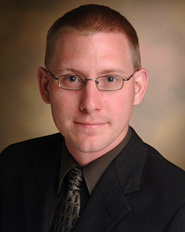
Alan Theisen (b. 4 October 1981; Port Huron, Michigan) is a Ph.D. graduate assistant in the Department of Music Theory at the Florida State University.
Composing since the age of sixteen, he has produced a steadily growing body of work distinguished by its musical energy and concentration of expression.
Representative works by Theisen include a Sonata for Alto Saxophone and Piano, Variations on a Theme of Gretchaninov, Eclogue for flute, and the Concerto for Alto Saxophone and String Orchestra (premiered by soloist Lawrence Gwozdz and the Szczecin Philharmonic in 2004). Recent compositions and commissions include Ritorno for flute and cello and a Triple Concerto. Noted composer Dimitri Terzakis commends Theisen's oeuvre as being "the product of a unique talent."
As a saxophonist, Theisen has toured the United States and Canada with the Sax-Chamber Orchestra, performing at two World Saxophone Congresses (Montreal - 2000, Minneapolis - 2003). He studied the instrument with internationally-recognized performer Lawrence Gwozdz and participated in masterclasses with famed saxophone pioneer Jean-Marie Londeix. No stranger to the podium, Theisen has been a guest conductor with several ensembles.
In an effort to showcase both his own original compositions and pieces by other contemporary composers, he founded the Intégrales New Music Festival in 2005. Now an annual event, Intégrales NMF features world-premiere performances by nationally recognized musicians. Intégrales has expanded to include musical collaborations with artists, authors, and dancers.
Theisen wrote his undergraduate thesis on György Ligeti's Piano Etudes, and has authored several papers on topics including Elliott Carter, film editing, composition as analysis, and Michael Brecker.
Other interests include mathematics, film criticism, and philosophy; in addition, Theisen has performed the role of Oberon in a production of Shakespeare's A Midsummer Night's Dream, for which he also wrote the incidental music.
Theisen lives with his wife (and puts up with their two cats) in Tallahassee, Florida.
|
|
|
|
|
|

Monday, October 02, 2006
Eight Simple Rules
Eight Sentences About Classical Music That Should Be Banned
(according to Matthew Guerrieri)
1) "Nobody actually enjoys listening to atonal music—they just want other people to think they’re a pretentious intellectual."
For the record, I enjoyed listening to atonal music well before I was a pretentious intellectual. Seriously, stop telling me that I don’t like what I do like, OK? Because otherwise, I’m going to have to bring up that whole Proust thing. And I know you never got through Swann’s Way.
2) "Jazz is America’s classical music."
The music of Adams, Babbitt, Bernstein, Billings, Brant, Cage, Carpenter, Carter, Copland, Corigliano, Crumb, Diamond, Eaton, Feldman, Fine, Flynn, Foss, Glass, Harbison, Heinrich, Imbrie, Ives, Johnston, Kirchner, Larsen, Macdowell, Moran, Nancarrow, Oliveros, Parker, Partch, Reich, Riegger, Riley, Rouse (both of ‘em), Ruggles, Seeger, Shapey, Tower, Williams, and (god help me) LaMonte Young (just to name a few) is America’s classical music. Jazz is jazz. Why is this so hard?
3) "Mozart and Beethoven were the popular music of their time."
Mozart and Beethoven may have been more popular than, say, Hartke and Wuorinen are today, but that hardly makes them 200-year-old equivalents of Justin Timberlake. Both relied heavily on royal patronage and a state-supported musical infrastructure. Both wrote the majority of their works for an aristocratic audience. (Want to breathe new life into this meme? Try working in John Gay.)
4) "The atmosphere at classical concerts is intimidating."
Too formal? Sure. Snobbish? On occasion. But if you find a bunch of well-dressed old people to be intimidating, a suggestion: maybe Mahler 6 isn’t the best entertainment choice for you in the first place.
5) "Orchestras need to do away with tuxedos because they’re stuffy and outdated."
Yeah, that James Bond—what a prudish old geezer. Besides, if all enterprises rose and fell on the aesthetic quality of their uniforms, Major League Baseball would have bit the dust years ago.
6) "Blah blah blah uptown composers blah blah blah downtown composers."
Look, I’m sure this particular dialectic felt terribly, vitally important at a certain place and time. But to all of us living in the vague and undifferentiated string of comical hick towns that New Yorkers regard the rest of the world to be, this is pretty much like listening to your grandparents debate the relative merits of Ovaltine and Postum. Think of how much wonderful music would result if all that wasted energy was applied to something constructive, like making fun of emo.
7) "In celebration of the [large number]th anniversary of the birth of [dead composer]."
Why is it that all those people who reject formalist composition as too intellectual and schematic are perfectly happy to flood the world with concerts/broadcasts/recordings of old-timers for no other reason than a numerological coincidence? Just asking.
8) "Composers today only write music for other composers."
Only if they’re buying.
posted by Alan Theisen
|
| |



